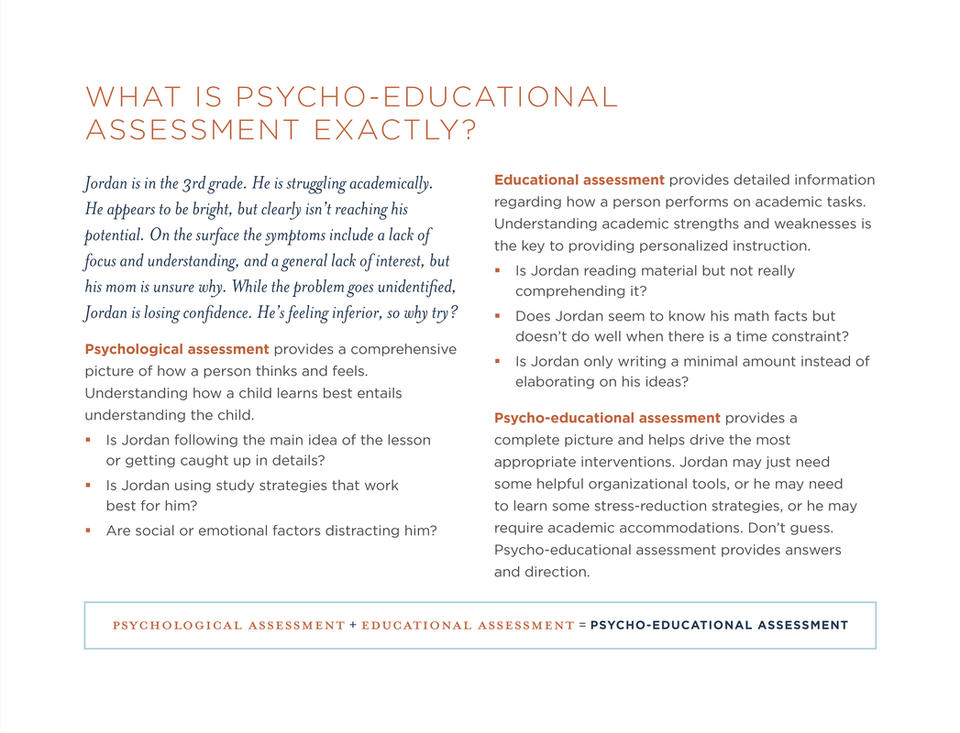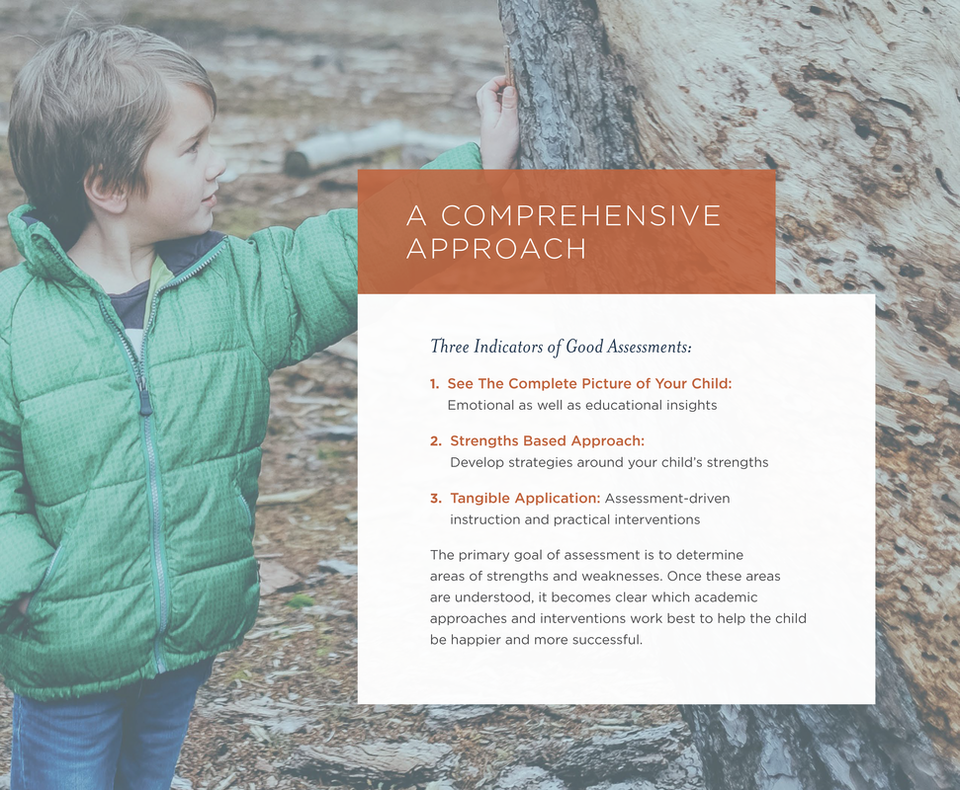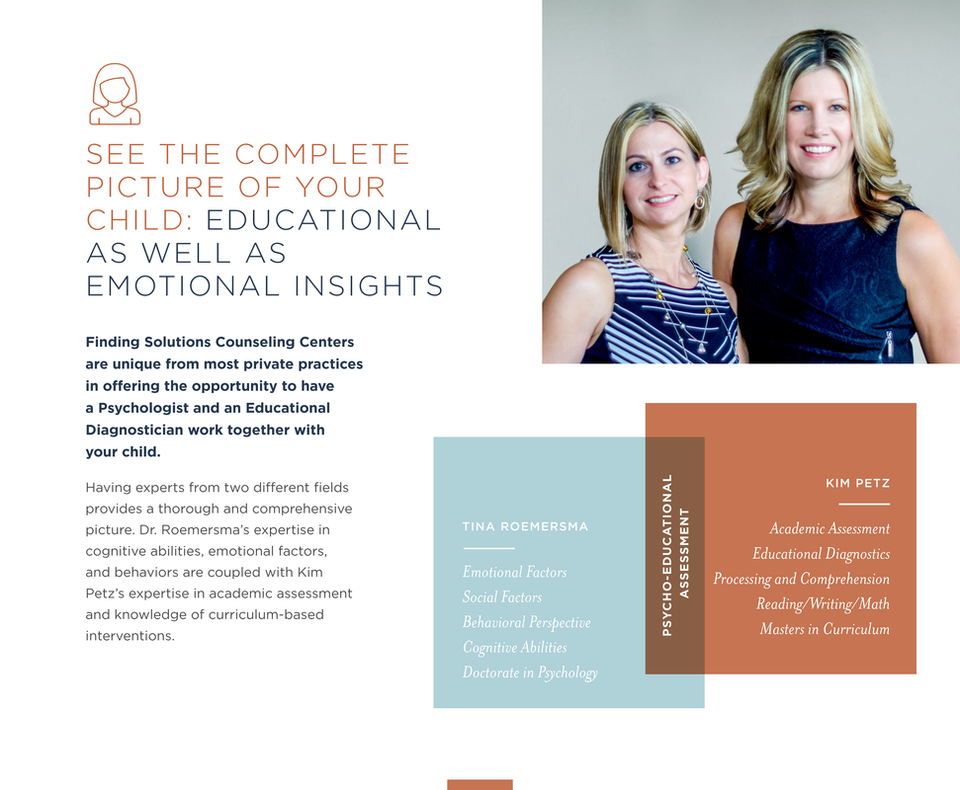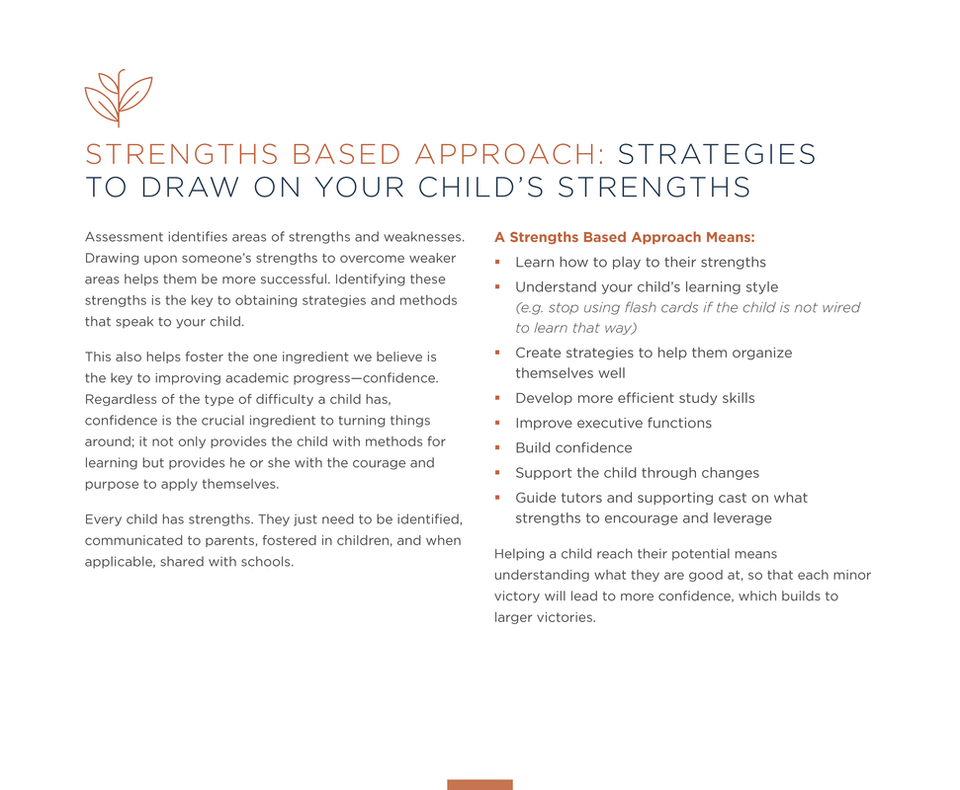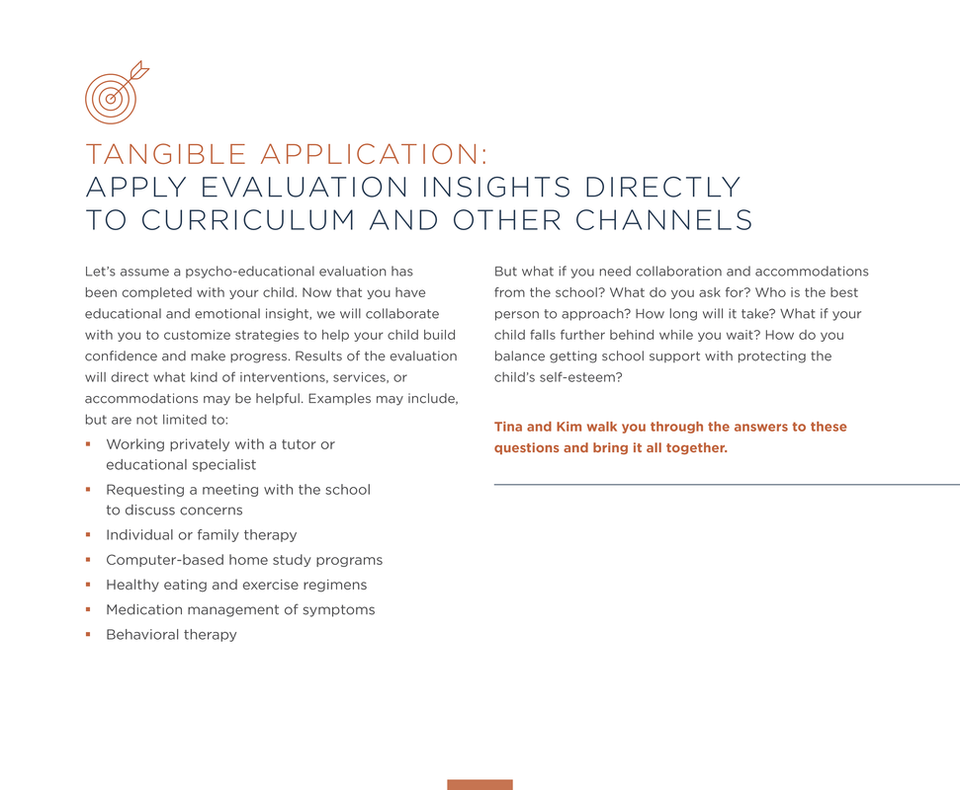Holistic psychological and educational assessment and evaluation. See a comprehensive picture, focus on your child's strengths, get tangible strategies for school curriculum.
Strengths based approach. See the full picture of your child. We specialize in Psychological and educational assessments. Psychological and educational testing. Academic testing and evaluation of your child. Test for autism, ADHD (attention deficit and hyper activity disorder), reading and writing disorders or difficulties, math avoidance. Cognitive, emotional, behavioral, academic factors. Get the complete picture. Slow processing speed. School behavior or grade problems, falling behind. School psychologist. Get the proper intervention. Get tangible strategies and curriculum.
SEE THE COMPLETE
PICTURE OF YOUR
CHILD: EDUCATIONAL
AS WELL AS
EMOTIONAL INSIGHTS
TINA ROEMERSMA
Emotional Factors
Social Factors
Behavioral Perspective
Cognitive Abilities
Doctorate in Psychology
KIM PETZ
Academic Assessment
Educational Diagnostics
Processing and Comprehension
Reading/Auditory/Math
Masters in Curriculum
Finding Solutions Counseling Centers
are unique from most private practices
in offering the opportunity to have
a Psychologist and an Educational
Diagnostician work together with
your child.
Having experts from two different fields
provides a thorough and comprehensive
picture. Dr. Roemersma’s expertise in
cognitive abilities, emotional factors,
and behaviors are coupled with Kim
Petz’s expertise in academic assessment
and knowledge of curriculum-based
interventions.
PSYCHO-EDUCATIONAL
ASSESSMENT
IS IT ANXIETY OR ADHD?
Anxiety and ADHD can present very similarly.
Both can contribute to difficulties in concentration
and learning and can cause restless behaviors.
If there is a learning disability present, what specific
areas is it affecting and how does it affect a child’s
self-esteem?
Could there be other factors impacting learning?
Bullying, shyness, and poor sleep patterns can also
lead to poor academic performance, but these factors
are identified and resolved very differently than
a learning disability.
If giftedness is present, does the child have the
motivation and maturity for the demands of specialized
programs? While doing well academically, is the child
perfectionistic and putting too much pressure on him
or herself?
Don’t misdiagnose—Avoid false positives.
Psycho-educational evaluations can avoid trial and error
medication testing. For example, don’t treat the child for
a learning disability when he or she is actually in the early
stages of depression. Get the full picture.
Go beyond the grade—You are your child’s advocate
and know your child best. Grades only give partial
academic insight. If you think your child could be getting
better grades and working more efficiently to complete
assignments, or you worry something might be hindering
him or her in a specific area, learn how to bring out the
best in your child. Assessment identifies areas of strengths and weaknesses.
Drawing upon someone’s strengths to overcome weaker
areas helps them be more successful. Identifying these
strengths is the key to obtaining strategies and methods
that speak to your child.
This also helps foster the one ingredient we believe is
the key to improving academic progress—confidence.
Regardless of the type of difficulty a child has,
confidence is the crucial ingredient to turning things
around; it not only provides the child with methods for
learning but provides he or she with the courage and
purpose to apply themselves.
Every child has strengths. They just need to be identified,
communicated to parents, fostered in children, and when
applicable, shared with schools.
A Strengths Based Approach Means:
Learn how to play to their strengths
Understand your child’s learning style
(e.g. stop using flash cards if the child is not wired
to learn that way)
Create strategies to help them organize
themselves well
Develop more efficient study skills
Improve executive functions
Build confidence
Support the child through changes
Guide tutors and supporting cast on what
strengths to encourage and leverage
Helping a child reach their potential means
understanding what they are good at, so that each minor
victory will lead to more confidence, which builds to
larger victories. Let’s assume a psycho-educational evaluation has
been completed with your child. Now that you have
educational and emotional insight, we will collaborate
with you to customize strategies to help your child build
confidence and make progress. Results of the evaluation
will direct what kind of interventions, services, or
accommodations may be helpful. Examples may include,
but are not limited to:
Working privately with a tutor or
educational specialist
Requesting a meeting with the school
to discuss concerns
Individual or family therapy
Computer-based home study programs
Healthy eating and exercise regimens
Medication management of symptoms
Behavioral therapy
But what if you need collaboration and accommodations
from the school? What do you ask for? Who is the best
person to approach? How long will it take? What if your
child falls further behind while you wait? How do you
balance getting school support with protecting the
child’s self-esteem?
Tina and Kim walk you through the answers to these
questions and bring it all together. Dr. Roemersma is a psychologist with a background
in clinical psychology and education studies.
She has worked extensively with adolescents
with behavioral and emotional challenges. She
also worked as a research assistant at Princeton
University on a project examining environmental and
behavioral factors for at-risk youth. The insight and
experience she brings drives a deep understanding
of the whole person, and understanding that is
necessary for tangible application.
Kim is a nationally certified teacher, which means
she has intimate knowledge of K-12 curriculum.
After 18 years of experience in the public schools,
she has a deep understanding of special education
process and procedures. Beyond this experience
she is a veteran in diagnostic and prevention services
who tailors assessment to better understand
individual strengths and weaknesses. While this
information is important in and of itself, Kim also
has the expertise necessary to offer prescriptive
recommendations to promote student growth
and success.
Kim particularly excels in guiding students towards
improvements in reading, writing, and math. Over the
last nine years, Kim has successfully completed over
500 evaluations.
